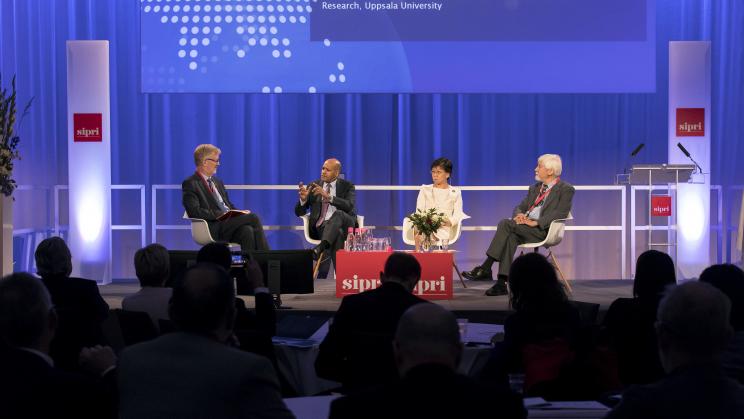
(Stockholm, 3 October 2019)—Today, over 200 experts, policymakers and practitioners are attending the fourth Stockholm Security Conference, on the theme ‘Conflict and Technology: Now and in the future’. Through plenary and breakout sessions, the conference will look at how the nature of conflict is changing today and what impact technology has on conflict.
Ambassador Jan Eliasson, Chair of the SIPRI Governing Board provided a welcoming address and covered the broad themes of the conference. Ambassador Eliasson observed that, ‘cyber warfare, lethal autonomous weapon systems—these terms have already permanently entered our vocabulary. The history of warfare is the history of technological innovation.’
Andreas Norlén, Speaker of the Swedish Parliament, provided the opening remarks highlighting the importance of the conference, ‘we need trendspotting and advance analysis in order to harness all the opportunities that technology and development give us and create possibilities rather than threats.’
The keynote speech was delivered by Izumi Nakamitsu, Under-Secretary-General and High Representative for Disarmament Affairs at the United Nations. Nakamitsu opened her speech with the caveat that, ‘it is important not to be an alarmist about the ramifications of technology, but at the same time, we should not be dismissive either.’ During her keynote speech, Nakamitsu shared some of the major conflict trends as she saw them from a UN perspective and the implications they hold for international peace and security.
A panel discussion was moderated by Dan Smith, SIPRI Director. Smith opened the conversation by asking if it was possible for different siloed actors to come together on these issues?
Professor Mohamed Mahmoud Ould Mohamedou, Head of the International History Department at the Graduate Institute Geneva, responded, ‘we may come from different places but we share the same moment in history. Our “new normal” is the unpredictable.’ The conversation continued on this topic with the question of whether what we recognize as novel is truly new?
Professor Peter Wallensteen, Senior Professor of Peace and Conflict Research at Uppsala University, engaged with this idea and stated, ‘new wars provide impetus for new technologies. Wars develop new technologies and new technologies create new possibilities of fighting.’
The discussion continued on with questions from the audience on the themes of the role of the private sector in the prevention agenda; the protection of civilians; and the future of arms control.
Smith concluded the Plenary session with the statement that, ‘at a point in time we will stop saying “this is really complex”. We are at that moment of moving into that new language and new understanding.’
About the Stockholm Security Conference and SIPRI
The Stockholm Security Conference is hosted by the Stockholm International Peace Research Institute (SIPRI), in partnership with Crisis Management Initiative (CMI), Mercy Corps, Munich Security Conference and the Swedish Civil Contingencies Agency (MSB).
SIPRI is an independent international institute dedicated to research into conflict, armaments, arms control and disarmament. Established in 1966, SIPRI provides data, analysis and recommendations, based on open sources.
For editors
For media or photo requests, please contact SIPRI’s Communications Officer Alexandra Manolache alexandra.manolache@sipri.org, +46 76 628 61 33.
Photos and videos from the event are available on the SIPRI website. Follow on Twitter with #SthlmSecCon. Livestreams of panel discussions are available on SIPRI’s Facebook page and YouTube channel.